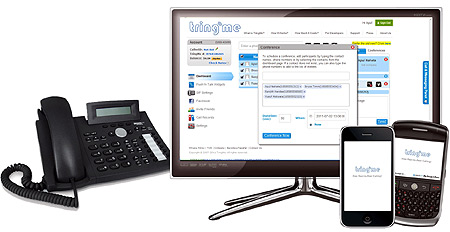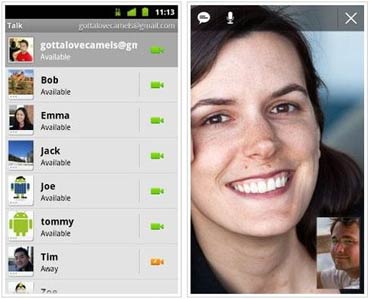
In May 2007, Yusuf Motiwala, an Indian software engineer started TringMe, a global communication service company to offer browser-based connectivity to users. Today, it has over 15 million subscribers from 80 countries. He tells us how he did it.
The success of an entrepreneur lies not in the idea, but in its execution believes Yusuf Motiwala, founder and CEO of TringMe, an emerging global telephony provider.
Motiwala describes himself as a 'perfectionist, idealist and straight talker' on his personal blog; his first love being product development.
So, what inspired this young engineer to quit a cushy job at Texas Instruments to start his own company one day?
After completing his masters in electrical engineering from Indian Institute of Technology-Bombay, Motiwala briefly worked with Stanford University, Palo Alto as a research engineer further serving as a software engineer at Hughes Network Systems and Lucent Technologies in the US, and Texas Instruments in India, before he moved on to work as a consultant. Needless to say, Motiwala was used to travelling extensively for work.
And every time he had to communicate with his family back in India, Motiwala had to use Skype or a calling card. Motiwala's father, a doctor by profession, once complained to his son that he was comfortable using browsers, but not with downloads and installations that applications like Skype required.
The thought struck to his mind -- What if one could develop a solution that will offer browser-based telephony?
That was the day TringMe was born.
But the idea was in its nascent stage and the concept had to be business ready. Besides Motiwala's idea had to compete with the likes of Skype and other web-based applications that were offering similar services for free. And Motiwala knew that anything that is free is viral, hence competitive.
So Motiwala added two important words to his business idea -- 'quality' and 'convenience'.
In four years since TringMe was started in May 2007, it was able to feel the pulse of consumers, find its niche and adapt itself.
Today, TringMe subscribes to 15 million users in over 80 countries, roughly accounting to 54 million calls a month, and yet continues to surprise users with its customised services to both retailers and entrepreneurs from time to time.
In this interview, Yusuf Motiwala, founder and CEO, TringMe takes us through his success journey and tells us how he made it.
Click NEXT to continue reading

What inspired you to start TringMe?
Several factors came together for the birth of TringMe.
For the last few years I used to travel quite often. As a result, I would use Skype or a calling card to stay in touch with family back in India. The family would be forced to use something similar, installing software etc which they were not quite comfortable with. I remember, one day, my father asked me 'how come with all the technology, it's not easier for us to call you directly from the browser just like we send you an email from the browser?'
The question was intriguing, especially coming from a "common" man who wants to use "technology" without really knowing about the "technology". And that's how the seed for TringMe was planted.
Coincidentally, another experience that helped "seal" the core-feature of TringMe -- the ability to make web-based voice calls -- originated from my repeated frustration of not being able to use any PC which has Internet connection to make a voice call, especially during my travels wherein I had to depend on cyber cafes.
Over the next few months, intrigued by questions and experiences like above, I questioned the very basis of existing (voice) communication mechanisms and realised that a platform which can unify various sources of voice communication (web, mobile, IM, VoIP) is the next logical step.

How did your father's idea develop into a commercial venture?
The idea was simple. We had to think how different users could benefit out of the service.
Imagine this -- let us say you want to build travel website wherein a customer can call in from the web or phone entering their details and consult with you on the go. Obviously, you do not want to invest heavily into voice technology and will want your business to be up and running within a day or so.
This is what TringMe intended to do -- allow your business to be completely voice-enabled with minimum investment and without having any voice or telecom expertise. Is this not cool?
As a business you do not pay anything to TringMe to integrate its platform and pay only for any telephony services that are used.
TringMe was the first company to launch a pure web-based calling solution. It all started because communication has been changing immensely in the last few years given the rapid penetration of social networking. This also meant that we could not just depend on traditional form of telephone communication which has been around for decades now.
TringMe's platform effectively integrates the traditional form of voice communication with the web and mobile devices to offer a unified voice communication solution.
TringMe could be used on your desktop, laptop, tablet, smartphone or any other mobile device.

How do you charge your users and make profit?
It costs nothing to become a TringMe user. All calls and text messaging between TringMe users from their phones is free. We only charge for calls or SMS made to people who are not on TringMe network.
For our business customers, the complete platform is available for free. They will only be charged for any calls and SMS that they make.
How is it different from Skype and Google Talk that offer the same service of video calling and chatting for free?
Skype has been a big revolution to make Internet calls commonplace. It definitely has changed the way a common man perceives VoIP calls. Having said that, Skype isn't a unified communication technology as TringMe is -- you have to use Skype to place calls, you can only call folks on Skype, you can call a person by dialling a phone number. Of course, you need to have Skype 'installed' on your machine.
Same is the case with Google Talk as well. Making calls to worldwide phone numbers was a missing capability in Google Talk. In fact, TringMe enabled a way by which any Google Talk user could make calls and send SMS directly from it by sending an instant message.
TringMe takes the experience of making calls to the next level -- nothing to download or install, just login and place calls. Calls can be made to phone numbers, email addresses and across various commonly used messengers (e.g. Google Talk).
Wouldn't it be interesting that anyone can call even your Google Talk or Yahoo Messenger from their cell phones? This is exactly where TringMe offers superior and well-integrated platform.
Even in mobile space, TringMe provides a MobileVoIP application that can be merely downloaded on any mobile device and calls can be made over data networks free of cost to other TringMe users. Skype doesn't have application for all the platforms to enable real-time calls or conference, for example as we do for the Blackberry users.

What were the challenges you faced with your first venture? How did you try to overcome them?
TringMe did not face any initial challenge, as we were in the space which had not been addressed before.
Clearly, there were technology risks because we set out to not only invent a way to make browser (flash) based calls, it was a part of the bigger platform that we intended to build.
Although, we had heard about companies building unified communication products/platform, it was very difficult to get our hands on a solution that would unify web, mobile and other gadgets/application that one uses. The excitement and challenges that were to be the part of our daily regimen kept us on our toe and motivated.
Breaking the inertia of traditional telephony and convincing individuals and companies (big and small) about the new way of unifying communication had its own challenges, especially from a company like ours which was in its early days.
On the way, we have built some staunch supporters and early customers who have stuck by us for this long.
A lot of what happens in the early days charters the path for the company and we are glad that things went well for us, for we believed whole-heartedly in our technology and that had a big impact on the moral of our small, but dynamic team.

What was it like moving from a salaried job to entrepreneurship?
The decision to leave a heavy paying job for a start-up is not everyone's cup of tea.
Fortunately, the organisations and the teams that I worked in always gave me enough space to grow, so the only noticeable change was, instead of taking my vehicle to go to an office, I was working from my home office. Today of course TringMe has an office so I am back to going to one (office).
What lessons did entrepreneurship teach you?
To be an entrepreneur in India, that too being a product development company is not an easy task. The Indian government should support entrepreneurs and have special policies for them.
The Kauffman Foundation, which looks at the level of US entrepreneurship, found that in 2010, 340 out of every 100,000 Americans started a business each month and the US government supports all of this.
Having said that TringMe has been accepted very well globally and we are working hard each day to better our products and our selves.
What are your plans for the future?
TringMe it is. How can I have an individual career plan? We are responsible for 15 million users and the numbers are just growing. My objective for TringMe is to be a globally recognised company from India. I cannot think of anything else besides this.
Where do you draw your inspirations for success from?
Where I get my inspiration from is still a mystery to me, call it my subconscious thoughts or creative urge within me, passion to innovate, seeing those millions of people using that innovation; these are some of the things that keep me inspired.
Kindly share some tips for aspiring entrepreneurs.
Believe in yourself. It will be a fun-ride with lots of ups and downs, you will need to have the spirit to see through the downs, yes it builds character.
Believe in the concept. It is very important that you think through the idea and are a hundred percent convinced that it is what you want to do. Of course, with time, you will need to adapt; but don't start anything half-heartedly.
Do not have any backup. Do not say to yourself that if this does not work, I will go back to a job. If you have a backup, it's almost given that you will not commit yourself hundred per cent and most likely fail. There is no replacement for hard work. You've got to be at it all the time.
Illustration: Uttam Ghosh